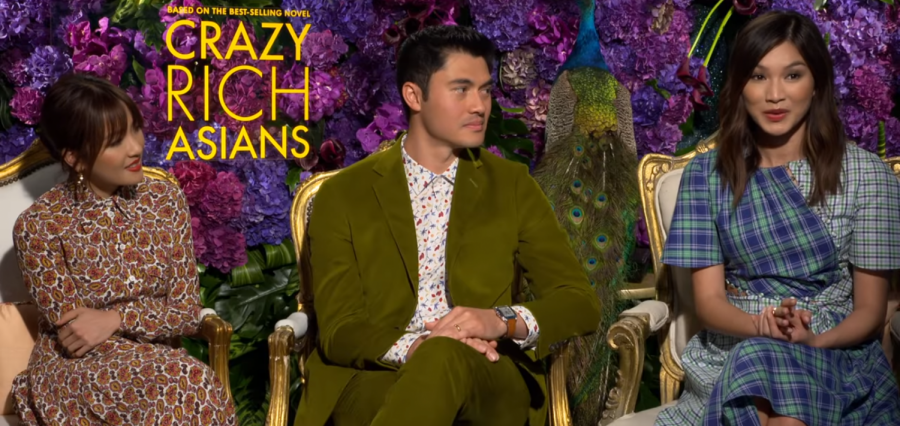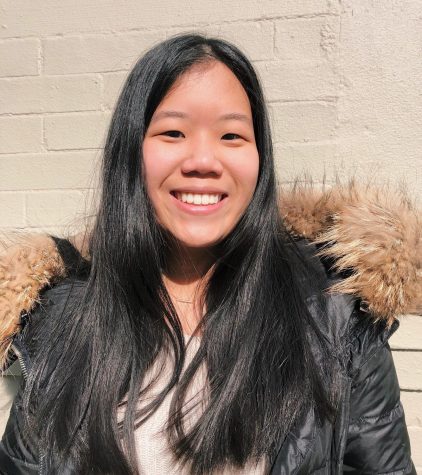RepresentASIAN: Crazy Rich Asians Review
Crazy Rich Asians truly lives up to its name. The film, which is based on the bestselling book by Kevin Kwan, is full of family conflict, unthinkable luxury and of course, Asians. The film features a revolutionary all-Asian cast, including superstars Michelle Yeoh, Ken Jeong and Constance Wu, as well as rising star Awkwafina. Director John M. Chu expressed that he was eager to cast Henry Golding, one of the two main protagonists, in what would become Golding’s first movie, but on screen, he looks as though he has been acting for years.
The film follows the romance of Rachel Chu (Constance Wu), an Asian-American economics professor at NYU, and Nick Young (Henry Golding), a humble heir to his family’s massive Singaporean real estate fortune. The movie begins as Nick invites Rachel to travel to Singapore with him for his best friend’s wedding, eager to introduce his girlfriend to his family. However, Nick refrains from telling Rachel about his family’s harsh, condescending ways, leaving Rachel to face the Young family’s criticism on her own. Nick’s mother, Eleanor, quickly disapproves of Rachel, assuming that due to her family’s low social status, Rachel is not fit to be with her son.
Throughout the movie, Rachel struggles to deal with jealous friends and nosy relatives, but her best friend Peik Lin (Awkwafina) is always there to support her through the conflicts. In the film, Peik Lin is given the nickname “Asian Ellen,” hence the blonde wig, and her humor certainly lives up to the title. Though Awkwafina is a newcomer in the film industry, she shined in this film as a vibrant, comedic character that caused endless laughs throughout the theater, and we hope to see more of her on the big screen in upcoming films.
*warning: spoilers ahead*
With Peik Lin’s humorous but meaningful words of encouragement, Rachel continues to defy Eleanor’s resentment. However, when Nick proposes to Rachel and tells her that if she says yes, he will leave his family behind and move to New York with her, she shockingly says no. In the following scene, where Rachel and Eleanor play the traditional Chinese tile-based game called mahjong, Rachel explains to Eleanor that she declined Nick’s proposal because she doesn’t want him to lose his family. She then removes a tile from her hand, allowing Eleanor to win. Rachel reminds Eleanor that when Nick marries another woman in the future, Rachel will always be the “poor nobody” that made it possible. Rachel shows her own hand, revealing that she would have won with that discarded tile and dramatically leaves the scene, leaving Eleanor, as well as the entire audience in the movie theater, full of emotion. This scene, with its clear imprints of Chinese tradition, also serves as a tribute to the 1993 film The Joy Luck Club, which is a movie based around the game of mahjong. The Joy Luck Club was the last movie since Crazy Rich Asians to feature an all-Asian cast, and Crazy Rich Asians’ meaningful mahjong scene marks a full circle between the two films’ 25 year gap.
As Rachel boards a plane back to New York, ready to leave Singapore behind, she is stopped by Nick as he rushes onto the plane and proposes to her amidst the chatter and movement of the fellow passengers. However, the true beauty of the proposal is the ring. Nick presents to Rachel not the ring he had originally proposed to her with, but with his mother’s engagement ring, signifying Eleanor’s seal of approval. The ending is cheesy but beautiful regardless, and it leaves viewers with a full heart as well as a few tears.
One of the most interesting aspects of the movie was how Chu integrated the beauty of Asian culture into several scenes. From a traditional dumpling-making scene to the competitive standoff between Rachel and Eleanor in a game of mahjong, we were immersed in a world of Asian culture, a concept that is not commonly portrayed in Hollywood films, if at all. The movie also effectively tackled several complex social issues, such as status, familial loyalty, and wealth. These intense scenes were perfectly balanced out with humorous and sentimental ones, so that while the issues were presented well and ingrained in the viewers’ minds, they did not take over the entire movie.
Overall, we highly recommend Crazy Rich Asians with its talented all-Asian cast and unique plot. Not only is it a beautifully filmed and portrayed romantic comedy, but it is a trailblazer for Hollywood films featuring people of color. Similarly to Marvel’s blockbuster Black Panther, Crazy Rich Asians has already reached the top of the box office less than a month after being released, and we can only hope that the achievements of these two films will pave the path for even more movies with diverse casts to be released in the future.











